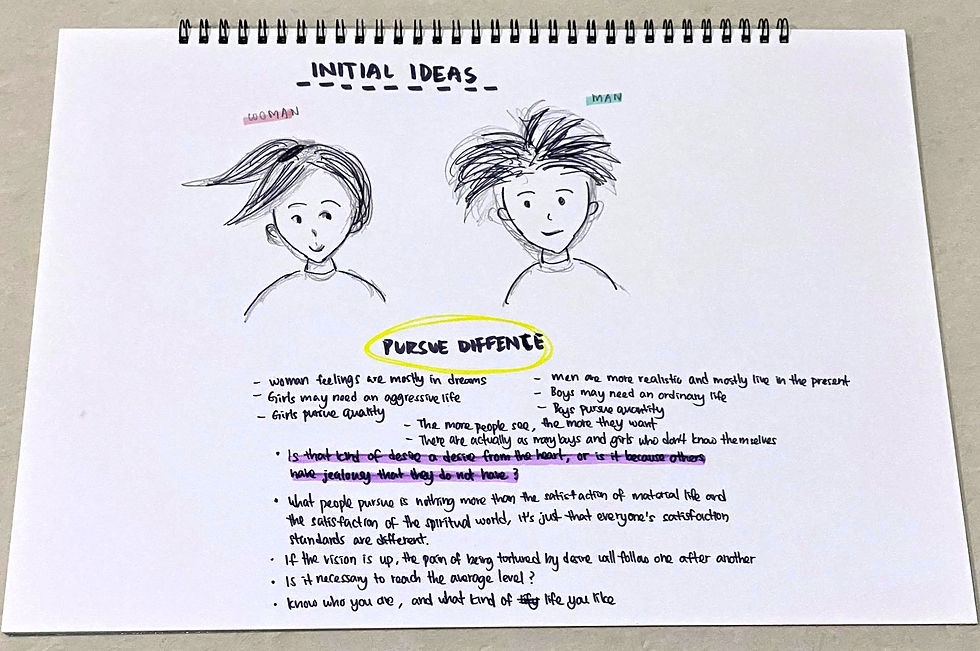WEEK 1.3: '3 POTENTIAL TOPICS'
- Evon Liew

- Apr 26, 2020
- 5 min read
1. Persuing perfection
I think that perfection in an illusion. Perfectionism isn't about high standards, it's about our critical inner voice. Some of the people believed that perfection would make them acceptable to others, if they could just achieve perfection, they would finally feel the deep love and inner acceptance longed for inside of ourselves. Also, since the sociall media is directly influencing our lives nowadays, negative body image issues are very common.
If we continually striving to achieve perfection has many negative consequences on your body and mind, such as anciety, depression, higher suicide rish and etc. The striving for perfection come from Low self-worth, Seeking recognition and Fear of failure.
The expert on perfectionism differentiates between the desire to excel and the desire to be perfect. It can be separated into two categories which are high achievers and perfectionists. High achievers are dedicated individuals who have a strong desire to accomplish tasks which are important to them. What others think of them is not relevant to high achievers and they are not afraid to fail. Perfectionists are never satisfied with their life because they are not satisfied with themselves. They don’t celebrate their accomplishments because they see them as flawed in one way or the other. They don’t perceive failure as a stepping stone towards further growth and development, but a fault in themselves, as individuals. For them, failure and making mistakes equal not being liked by others.
So, I'm disagree with the thoughts of perfectionists in our lives. This is the way to avoid becoming a perfectionist instead of a high achivers. First, admit to our own struggles and failures and refrain from showing a perfect life because it’s not true. Next, show them the learning never stops and discuss about how you have areas for growth like everyone else, Also, foster healthier relationships with the important people in your life.
In my conclusion, be a conscientious person not a perfectionist. Conscientious people have healthy coping mechanisms with failure. They sayI did my best, but I failed. It’s ok, I’ll do better next timewhile perfectionists tell themselvesI failed – I’m a failure, I’m not good enough. As my stronger belief, " The unexamined life is not worth living.", everything happens for a reason.
2. Build social circle
A social circle is a group of socially interconnected people. Studies have shown that good social networks can reduce the likelihood of feeling sad, lonely or experiencing low self-esteem. Our friends and family can play a huge role in our mental well-being and can help us manage mental health issues such as stress, anxiety and depression. Things to know when building social circles, which are Deal with loneliness before aloneness , Have a positive perspective, unaffected by past friendships, You’re not weird because you make the first move, Different friends fulfill different needs.
These are the ways to create social circles, first attend social events. It's important to be confident and friendly to talk about things that you are really interested in. Also, be vulnerable to make people feel more comfortable in your presence, encourages them to open up to you. Remember to bail quickly from bad conversations. Second, follow up immediately with a text to the person saying it was great chatting with them at the event. If they are a very social person, they will follow up with a specific recommendation on when to meet, or an invite to another event. Last, maintain relationship. We have to put in a little extra work to ensure that you continue to build the relationship. It's good at consistently schedule group social activities because consistency is the key to strong friendships.
A social circle also gives you a platform where you can discuss all your problems and ask for suggestions from many people at once. There are times when we want to discuss a particular issue with people who are not involved in it, and a social circle provides you just that. Similarly, there are times when you take up interest in something new, like some current affairs. You probably can’t discuss that at home but you can do so when you meet a few people over drinks. Sometimes, we need people just to tell us that the way we think and function is right. A social circle doesn’t only assure you this, but also respects you for what you do right. In a way, it also helps in motivating. Those are the benefits.
But there are the disadvantages of having many friends. For example, you can't spend quality time with each and everyone of them especially when each of them belong to different friend circles. Also, you might end up hurting one of them if you paid attention to the other. They might feel "left out". Not only that, it's even more tiring to share good news. Especially when you have to call each and everyone up. At the end, if you are not cautious you might eventually lose a few friends.
In my conclusion, it's a complete matter of perspective to have many friends. In my life, I have experienced that you can never have enough friends, but when push comes to shove only a few good ones stick around. Choose well and wisely. Cut off the acquaintances and see who loves you the most. They are the keepers. In fact, having more friends mean social isolation and loneliness. Social networks make you feel less satisfied. This topic is linked to the first one.
3. Develop multiple skills
According to new research, practice doesn’t make actually make perfect. Whether you’re trying to be pro at Photoshop, or set up your mobile games, you’re probably dutifully following the age-old advice that practice makes perfect. However, contrary to popular belief, doing the same thing over and over again might not be the most efficient way to learn foreign concepts.
Several new neurological studies show that an up and coming learning method called “interleaving” improves our ability to retain and perform new skills over any traditional means by leaps and bounds.
There are some practical ways you can use interleaving to train your brain to pick up new skills quickly and effectively. First, practice multiple parallel skills at once.The advantage of this method is that your brain doesn’t get comfortable or store information in your short-term memory. Instead, interleaving causes your brain to intensely focus and problem solve every step of the way, resulting in information getting stored in your long-term memory instead. Next, plan your lessons in advance. Since randomization and spacing out lessons are crucial to the interleaving process, try planning when and what you want to cover in a lesson in advance. A pre-planning will make adopting a new skill set go by much faster. When it comes to interleaving, this will keep you from getting frazzled with the new learning process. Third, go back to basics. When we progress with a new skill, it’s easy to forget to practice older material. But going back over the basics is an integral part of the interlearning process. Doing so strengthens our brains and reinforces our long-term memory of a skill. This will result in higher and faster retention overall. Last, break out of your comfort zone. Often, we’re gravitated towards repeated tasks that we already have a basic grasp of and exist in our comfort zones.The whole process of interleaving feels pretty uncomfortable at first, especially when you’re trying skills from new angles and failing a lot. When you realize that practice does not mean perfection, and that every step new towards finding a skill is a step forward, you’ll have the winning attitude to use interleaving to your advantage.
In my conlcusion, it's able to use interleaving to our advantage and learn any skill at lightning speed like a champ. If we learn many skills will later serve our country in many ways, and also glory for the country. Then, if we become role model of others, we'll never feel lack of confidence or even imperfect and link to topic 1.


Comments